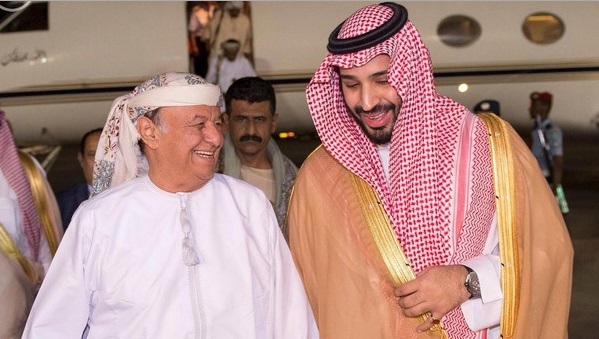Saturday 28 March 2015 - 11:22
Story Code : 157113
Yemen strikes are test of youthful Saudi defence minister
The surprise assault is meant to stem the rapid advance of the Zaydi Shia militia that, allied with former president�Ali Abdullah Saleh, has brought the Sunni Gulf allied-Yemeni government to the brink of extinction.
Saudi�television broadcast looped footage of the 30-year-old defence minister on the phone, receiving briefings from high-ranking personnel before showing pilots studying flight plans and F-16s taking off from their desert bases.
Such patriotic propaganda has become commonplace in the Gulf as these well-armed states pursue increasingly muscular,�adventurist foreign policies.
MbS � the moniker bestowed on him by diplomats � is emerging as the youthful embodiment of this new Saudi strategy.
War in�Yemen�could prove to be a pivotal moment for the young prince, who is said to have become a favourite of his father because of his work ethic.
�This is the test of his life � he has to prove himself,� says Abdulkhaleq Abdullah, a Dubai-based political analyst. �For new princes, it is all about delivering and earning it.�
The prince�s sudden promotion to defence minister, head of the royal court and economic policy co-ordination chief when his father�Salman became king�in January surprised foreign diplomats and Saudis alike.
Over the past five years, the tall and imposing MbS has been at his father�s side as a special adviser and personal gatekeeper to his court. His decisiveness impressed the then crown prince and made MbS a family favourite.
In the traditional�majlis, where citizens petition rulers over grievances and financial requests, MbS proved himself as a tireless worker and administrator.
During this grooming period, his father took over the defence ministry on the death of his older brother, Sultan, in 2011, allowing MbS to wield some influence.
Once known for a propensity to throw his weight about in business dealings, his allies say the prince has matured since marrying and having children.
After the�death of King Abdullah�in January, his ageing father has given MbS serious power � as evidenced by his starring role in one of the kingdom�s most assertive foreign policy moves for years.
�This Yemen operation could make or break him at a very young age but MbS will get 100 per cent of his father�s support,� says Robert Lacey, author of�The Kingdom: Arabia and The House of Saud.
�Salman may be losing some energy with age but clearly there has been a fresh vitality, for good or ill, injected into Saudi policy since he took over. Decisions have been pushed through quickly and hard,� he added.
King Salman, who has lavished handouts on his people despite a collapse in oil revenues, has also�restructured�top decision-making bodies. MbS has become part of a trio of top security officials, as well as the economic development tsar.
A vast swath of economic policy falls under MbS�s purview in his role as chairman of the Council of Economic Development Affairs, a kitchen cabinet tasked with reforming and boosting an economy that remains too oil dependent and is failing to create enough jobs for the country�s youth.
As well as the Yemeni campaign abroad, the prince�s attempts to grow the economy may well define his success or failure.
These include Sultan, the kingdom�s first astronaut; Abdulaziz, second-in-command at the Saudi oil ministry; Faisal, Medina�s governor who, for his Oxford doctorate, studied Saudi-Iranian relations in the late 1960s as the UK quit the Gulf; and Khaled, who has been flying bombing sorties against the Islamic State in Iraq and the Levant, or Isis.
Though MbS is in charge of defence, other royals have key roles in the country�s security infrastructure.
The late King Abdullah�s son, Muteb, retains control over the national guard, the kingdom�s most effective security force. Mohammed bin Nayef, or MbN, selected over Muteb as the first in line to the throne from the younger generation as deputy crown prince, has continued as interior minister.
As such, MbN remains the senior security official, responsible for co-ordinating internal security policies against domestic terrorism. He also holds a special Yemeni brief, alongside the foreign ministry.
The television footage of the Yemen operation pictured MbS showing MbN around the operations room. It conveyed that the more experienced interior minister was overseeing his younger cousin, the new defence minister.
But the overriding impression is of the rapid rise of a young prince, moving from local politics to the global stage.
Observers who expected MbS�s time at the defence ministry to focus on handling procurement may have to adjust their expectations: co-ordinating the attack on Yemen has turned the prince into a man of action.
By FT
# Tags











